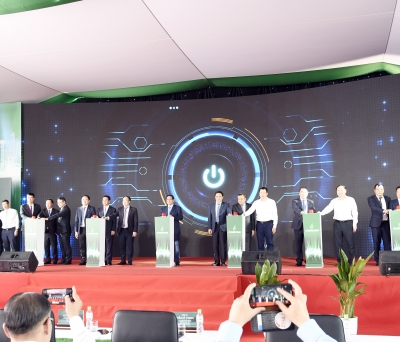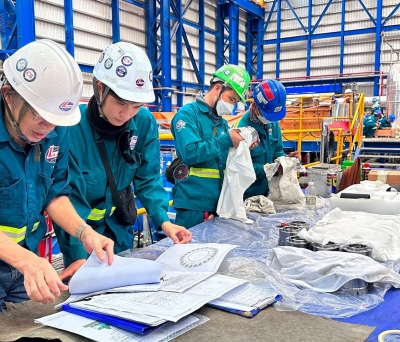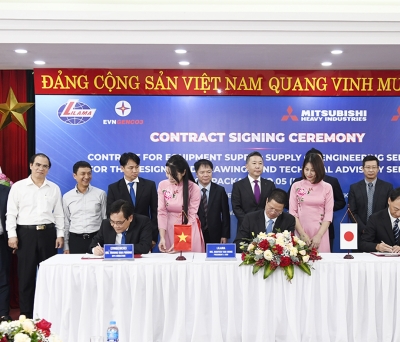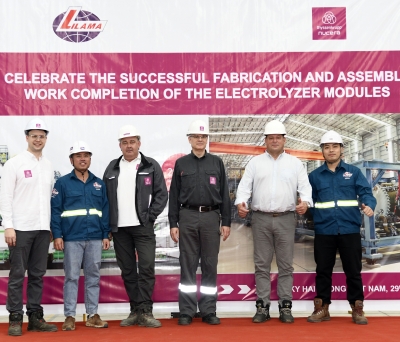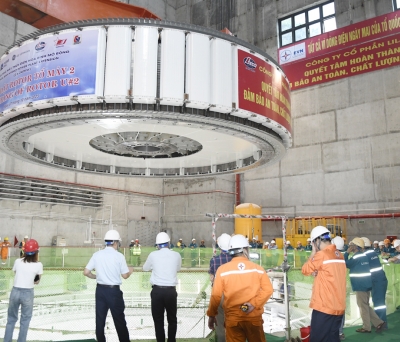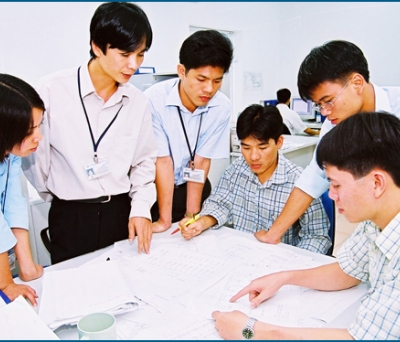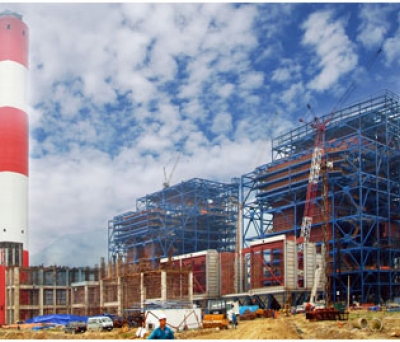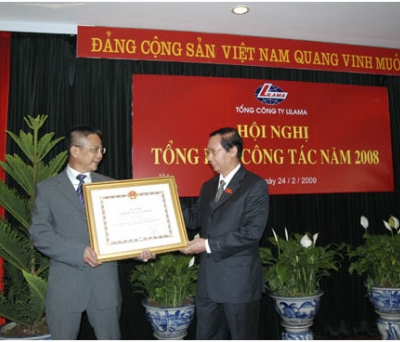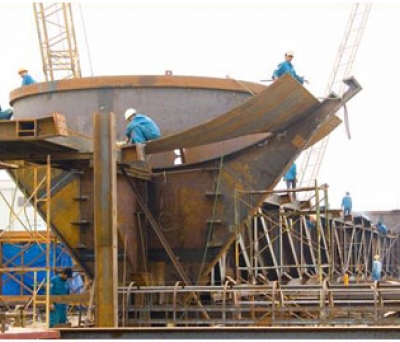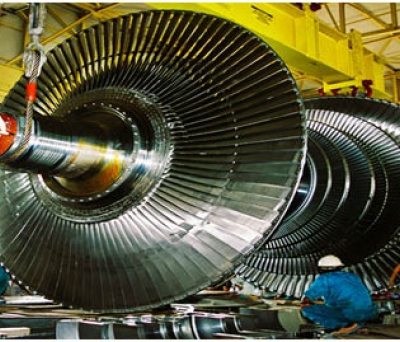Re-establishing the position of Vietnamese mechanical branch (Instalment I)
Mechanics is the foundation, core, base and motive force for other industrial branches to develop. Investing to develop mechanical branch is the long-term investment with depth. However, the implementation of mechanical developing strategy over the past 10 years does not seem effectively, and it makes mechanical enterprizes like "children to be brought up but donot grow forever".
Article 1: Shortage of "ground"
For the time being, Vietnamese mechanical enterprizes are capable of manufacturing synchronous equipment for rotative kiln cement plants with capacity of upto 700 thousand tons per year, producing 500 kV power transformers, successfully manufacturing oil-rigs of 120m deep under water, etc. Having capability, but the supporting policies are not brought into play efficiently, making the "output" of mechanical products very stuffy. Many mechanical enterprizes "have no ground", so after tens of years they just fabricate, manufacture, and are sub-contractors, they donot dare to invest in business with depth and their profits are very low.

Mechanical enterprizes just "live in want"
Taking us to the site of manufacturing Tam Dao 05 self-lifting oil-rig, Engineer Bui Thanh Tai of PV Shipyard JSC proudly told us that up to that time, the Tam Dao 05 was the biggest self-lifting oil-rig in Vietnam with the total quantity of approximately 18 thousand tons of iron & steel, capable of exploiting in the depth of 120m under water and drilling for oil of 9km deep. This project had specific characteristics of structure, for example, some single equipment weighed upto 90 tons and when being assembled, the totol weight could reach 600 tons. To finish the project, the company had to pay money to invest in a self-operating crane with lifting capacity of 1,100 tons, two times as bigger as the gantry crane in Son La hydro power plant and was the biggest in Vietnam for the time being. At the project site, there were usually about 800 engineers and workers, and if necessary, the amount could be 3,000 thousand people, striving for handing over to the Owner Vietsovpetro joint-venture within 30 months (6-2016), 2 months earlier than the planned schedule.
General Director of PV Shipyard Phan Tu Giang said, in the condition that the company charter capital was little (about 600 billion dongs), to build an oil-rig valued over USD 200 million like Tam Dao 05, obviously the company had to borrow money. Although manufacturing oil-rigs or building bases for oil-rigs belonged to main important mechanical projects, after 7 years of operation, the company had never enjoyed any preferential treatment in finance from the State. Almost banks alleged that enterprizes had to prove they were supported in interests then the banks would give them a loan. In addition, the loan procedures were very annoying and complicated, so enterprizes had to borrow money from foreign countries with high interest in order to deploy their projects in accordance with the schedule. In the first project, the company even had to borrow VND 800 billion with very very high interest of 21% per year in 2010, and that was why they got a very big burden of debt.
However, PV Shipyard is now considered as an enterprize with the most brilliant future in the mechanical branch. According to figures from Vietnam Association of Mechanical Incorporation (Vami), there are approximately 3,100 mechanical enterprizes in the total 53 thousand mechanical manufacturing bases all over the country. About 50% of those specialize in manufacture and installation, almost the rest are only repair workshops, trivially and retail. The potentials of mechanical branch are not weak, but the moment "health" of each enterprize is too sick, develops retail and dispersedly. Chairman of Vami Nguyen Van Thu remarked that our mechanical branch were facing many hardships at the same time. It was so difficult for mechanical enterprizes to access capitals and there were not yet any solutions. Though Decision No. 10/2009/QÐ-TTg dated 16-1-2009 by Prime Minister on supporting to develop the production of main important mechanical products has been effective for 5 years, up to now there have been only 3 projects of this type to be signed with the total capital of VND 374 billion, and the real expenditure for them is just more than VND 60 billion. There have been many good policies and guidelines for the branch development, but investment is still in dribs and drabs, about USD 300 million. Besides, the "osmose" of the policies are not good, the deployment of them to support mechanical branch is jammable, not synchronous, all these make mechanical enterprizes enjoy no benefit.
In fact, for a long time, almost main important mechanical projects were awarded to foreign contractors, especially Chinese ones, so, the inside mechanical businesses had no "ground". These enterprizes were still weak and had no union with eachother, every one is just for himself whereas many mechanical businesses having capabilities in both finance and skillful manpower were very disappointed with the severe principles, lack of necessary priority in bidding and awarding bids of main important mechanical products. This has been a force majeure in the situation that resources inside the country are still limited, "auction" is more important than "bidding", and this can bring about bad effects later.
Good policies, bad deployment, the effect is reduced
The story of no prior capital for 7 years of PV Shipyard is not strange. Chairman of Xuan Kien motor car company (Vinaxuki) Bui Ngoc Huyen reckoned, it was not that enterprizes were afraid of difficulties, but the deployment of policies was as if "deceiving" them. Vinaxuki had set up the project of manufacturing car shells with the loan capital of VND 250 billion, and Prime Minister accepted and guided ministries & branches to deploy, but after 3 years, there were no money for it. Mr Huyen suggested that the policies needed realism. Policies were good, but the deployment lasted too long, this made enterprizes lose business chances and thus lose their trust. The guideline of implementing main important projects in the form of domestic EPC main contractors had been defined to be an efficient solution giving an impulse to the mechanical branch to develop, but in fact, all policies were just "from the heaven".
Lilama General Director Le Van Tuan confided in us that when Lilama was assigned to be an EPC contractor, the member companies had a chance to invest in equipment, facilities and building their mechanical manufacturing factories so as to raise the percentage of interiorization. Prime Minister approved the mechanism of implementing pilot domestic design and manufacture of equipment for thermal power plants in period 2012 - 2025 (Decision No. 1791/QÐ-TTg dated 29-11-2012) with 11 small tender packages to be prior for interiorization, but up to now, there are only some projects to be deployed and there are not yet enough prior packages. Preliminarily, the value of an entire EPC package is about USD 1.5 billion, and the total value of all these 11 prior packages are at least from USD 400 to 500 million. With lots of projects which are under construction and will be built, this is a very big "piece of cake", ensuring jobs in many years for domestic mechanical enterprizes. The governmental policy was issued exactly, but to deploy it efficiently, we should be the master of capital resources. For a thermal power project, the banks are not able to arrange immediately VND 10 billion for prior tender packages. That is why, searching for outside capitals is an indispensable tendency and it needs strong entry and linking intensification of banks so that mechanical enterprizes have adequate conditions to be awarded tenders, maintain their production and step by step have some surplus for re-investment.
Back to the story of PV Shipyard, General Director Phan Tu Giang shared, for the time being, enterprizes had to compete not only in prices, schedules, quality but also the financial capability. Previously, owners usually payed money according to work schedules, so contractors partly were not worried about capital resource. But recently, in severe competition, financial matter becomes more important. For a project, owers only pays about 20% in advance, and contractors must face the rest capital until the project is finished. In that condition, many projects have come "out of reach" of domestic mechanical enterprizes with weakness & thin capital. For example, PV Shipyard had signed a contract of building an oil-rig with an Indian partner, and the customer had accepted to deposit 20% of the contract value. However, after a year searching for capital resource in all ways, PV Shipyard had to cancel the contract due to their failure in arranging capital. Going to the bank, PV Shipyard received a cold answer: "If the oil-rig is unsaleable, why will we take it (as a mortgage asset)?". Mechanical products are not ensured assets for loans, are they?
Over the past years, many projects of thermal power, oil refinery, etc. have relied upon foreign capitals and have been performed by foreign EPC contractors, so domestic enterprizes do not have chances to participate in supplying equipment and they are still sub-contractors. Vice Manager of Heavy Industrial Department (Ministry of Industry and Commerce) Pham Anh Tuan said, all proposed solutions are just exact for the aims, but the feasibility depends on efforts from enterprizes and timely adjusting policies from the state organs. May be the most important thing at the moment is the credit policy. The preferential interest of Vietnam Development Bank is now 10.5% per year, and it is considered that the preferential door has closed in front of mechanical branch. The bidding policies in current Bidding Law are not applicable, and the previous ones are very hard for mechanical enterprizes.
"Epidemic" of foreign EPC Contractors
Since 2008, the "epidemic" of foreign EPC contractor has been spreading to our country, reducing the efficiency of the interiorizing programme for cement plants, thermal power plants. Many jobs that domestic enterprizes were doing have been lost. Now, matters regarding power projects are being prevented, and in the future, a mass of Chinese cement chains will have to be improved. This is both a lesson and a chance for mechanical enterprizes to actively participate in and step by step occupy the market.
TONG VAN NGA Chairman of Vietnamese Construction Material Association
Paradox of investment in mechanics
Investment in mechanics has been defined as a long-term one, mainly relies on budget resource. A paradox happens when the condition of state budget resource is limited, capital loans of commercial banks are "plentiful", but mechanical enterprizes do not belong to the approved cases. This vicious circle has been going on repetitively over the past many years, but there is still no feasible solutions. The role, position and importance of the mechanical industry during the development of the country has been learnt by heart by managing organs from the Central Level to local ones, but the real deployment is as if "starting engine but notyet pressing gears" and this make the mechanical "car" can not move.
NGUYEN VAN THU, Chairman Vietnam Association of mechanical incorporations (Vami)
to be continued...
Le Xuan Thuy (People Newspaper)


